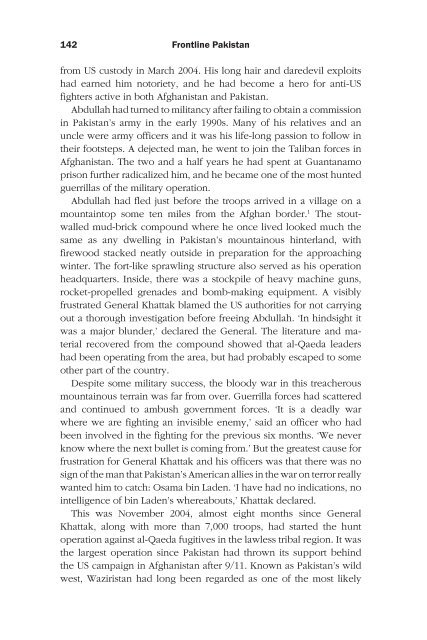Frontline Pakistan : The Struggle With Militant Islam - Arz-e-Pak
Frontline Pakistan : The Struggle With Militant Islam - Arz-e-Pak
Frontline Pakistan : The Struggle With Militant Islam - Arz-e-Pak
You also want an ePaper? Increase the reach of your titles
YUMPU automatically turns print PDFs into web optimized ePapers that Google loves.
1 <strong>Frontline</strong> <strong><strong>Pak</strong>istan</strong><br />
from US custody in March 2004. His long hair and daredevil exploits<br />
had earned him notoriety, and he had become a hero for anti-US<br />
fighters active in both Afghanistan and <strong><strong>Pak</strong>istan</strong>.<br />
Abdullah had turned to militancy after failing to obtain a commission<br />
in <strong><strong>Pak</strong>istan</strong>’s army in the early 1990s. Many of his relatives and an<br />
uncle were army officers and it was his life-long passion to follow in<br />
their footsteps. A dejected man, he went to join the Taliban forces in<br />
Afghanistan. <strong>The</strong> two and a half years he had spent at Guantanamo<br />
prison further radicalized him, and he became one of the most hunted<br />
guerrillas of the military operation.<br />
Abdullah had fled just before the troops arrived in a village on a<br />
mountaintop some ten miles from the Afghan border. 1 <strong>The</strong> stoutwalled<br />
mud-brick compound where he once lived looked much the<br />
same as any dwelling in <strong><strong>Pak</strong>istan</strong>’s mountainous hinterland, with<br />
firewood stacked neatly outside in preparation for the approaching<br />
winter. <strong>The</strong> fort-like sprawling structure also served as his operation<br />
headquarters. Inside, there was a stockpile of heavy machine guns,<br />
rocket-propelled grenades and bomb-making equipment. A visibly<br />
frustrated General Khattak blamed the US authorities for not carrying<br />
out a thorough investigation before freeing Abdullah. ‘In hindsight it<br />
was a major blunder,’ declared the General. <strong>The</strong> literature and material<br />
recovered from the compound showed that al-Qaeda leaders<br />
had been operating from the area, but had probably escaped to some<br />
other part of the country.<br />
Despite some military success, the bloody war in this treacherous<br />
mountainous terrain was far from over. Guerrilla forces had scattered<br />
and continued to ambush government forces. ‘It is a deadly war<br />
where we are fighting an invisible enemy,’ said an officer who had<br />
been involved in the fighting for the previous six months. ‘We never<br />
know where the next bullet is coming from.’ But the greatest cause for<br />
frustration for General Khattak and his officers was that there was no<br />
sign of the man that <strong><strong>Pak</strong>istan</strong>’s American allies in the war on terror really<br />
wanted him to catch: Osama bin Laden. ‘I have had no indications, no<br />
intelligence of bin Laden’s whereabouts,’ Khattak declared.<br />
This was November 2004, almost eight months since General<br />
Khattak, along with more than 7,000 troops, had started the hunt<br />
operation against al-Qaeda fugitives in the lawless tribal region. It was<br />
the largest operation since <strong><strong>Pak</strong>istan</strong> had thrown its support behind<br />
the US campaign in Afghanistan after 9/11. Known as <strong><strong>Pak</strong>istan</strong>’s wild<br />
west, Waziristan had long been regarded as one of the most likely













